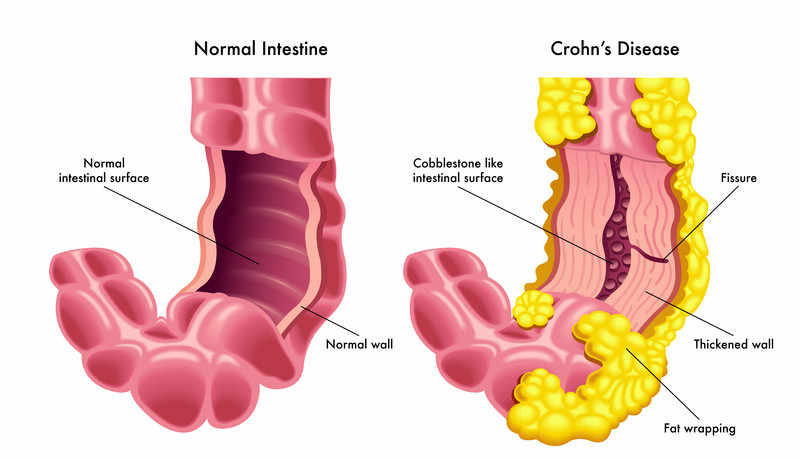
Crohn’s disease is a chronic inflammatory condition that affects the gastrointestinal (GI) tract. It is one of the two primary forms of Inflammatory Bowel Disease (IBD), the other being ulcerative colitis. Crohn’s disease can cause significant discomfort, disrupt daily life, and lead to serious complications if not managed properly. In this deep dive, we’ll explore what Crohn’s disease is, its symptoms, treatment options, potential complications, and the prognosis for those living with this condition.
What is Crohn’s Disease?
Crohn’s disease is a chronic autoimmune disorder that causes inflammation in the digestive tract. Unlike ulcerative colitis, which only affects the colon, Crohn’s disease can impact any part of the GI tract, from the mouth to the anus. However, it most commonly affects the small intestine and the beginning of the large intestine (colon).
The inflammation caused by Crohn’s disease often spreads deep into the layers of the intestinal wall, leading to symptoms such as pain, diarrhea, and malnutrition. The exact cause of Crohn’s disease is unknown, but it is believed to result from a combination of genetic, environmental, and immune system factors.
Symptoms of Crohn’s Disease
The symptoms of Crohn’s disease can vary widely depending on the location and severity of the inflammation. Symptoms may range from mild to severe and can include:
Common Symptoms
- Persistent Diarrhea: Frequent, watery stools are a hallmark symptom.
- Abdominal Pain and Cramping: Often occurs in the lower right abdomen.
- Weight Loss: Due to reduced appetite and malabsorption of nutrients.
- Fatigue: Caused by inflammation and nutrient deficiencies.
- Fever: Low-grade fevers may occur during flare-ups.
Other Symptoms
- Rectal Bleeding: Blood in the stool may occur if the colon or rectum is affected.
- Mouth Sores: Ulcers in the mouth can develop during flare-ups.
- Reduced Appetite: Pain and discomfort may lead to a lack of desire to eat.
- Perianal Disease: Fissures, fistulas, or abscesses around the anus.
Extraintestinal Symptoms
Crohn’s disease can also affect other parts of the body, leading to:
- Joint pain or arthritis
- Skin rashes or lesions
- Eye inflammation (uveitis or episcleritis)
- Liver or bile duct inflammation
Treatment Options for Crohn’s Disease
While there is no cure for Crohn’s disease, treatment aims to reduce inflammation, manage symptoms, and prevent complications. Treatment plans are tailored to the individual and may include:
1. Medications
- Anti-inflammatory Drugs: Such as corticosteroids and aminosalicylates to reduce inflammation.
- Immunosuppressants: Like azathioprine or methotrexate to suppress the immune system.
- Biologics: Such as infliximab or adalimumab, which target specific proteins involved in inflammation.
- Antibiotics: To treat infections or fistulas.
- Antidiarrheal and Pain Relievers: For symptom management.
2. Lifestyle and Dietary Changes
- Dietary Adjustments: Avoiding trigger foods (e.g., dairy, high-fiber foods) and following a low-residue or specific carbohydrate diet.
- Stress Management: Techniques like yoga, meditation, or therapy to reduce stress, which can exacerbate symptoms.
- Regular Exercise: Helps improve overall health and reduce inflammation.
3. Surgery
Surgery may be necessary if medications fail to control symptoms or if complications arise. Common procedures include:
- Strictureplasty: To widen narrowed sections of the intestine.
- Resection: Removal of damaged portions of the intestine.
- Colectomy: Removal of part or all of the colon.
Complications of Crohn’s Disease
If left untreated or poorly managed, Crohn’s disease can lead to serious complications, including:
1. Intestinal Complications
- Strictures: Narrowing of the intestine due to scar tissue.
- Fistulas: Abnormal connections between the intestine and other organs or skin.
- Abscesses: Pockets of infection in the abdomen or anal area.
- Bowel Obstruction: Blockage in the intestine caused by inflammation or scar tissue.
2. Nutritional Deficiencies
- Malabsorption of nutrients can lead to deficiencies in vitamins (e.g., B12, D) and minerals (e.g., iron, calcium).
3. Systemic Complications
- Osteoporosis: Due to calcium and vitamin D deficiency.
- Anemia: Caused by chronic blood loss or iron deficiency.
- Increased Risk of Colon Cancer: Long-term inflammation in the colon raises the risk.
Prognosis for Crohn’s Disease
The prognosis for individuals with Crohn’s disease varies depending on the severity of the condition, the effectiveness of treatment, and the presence of complications. Key points to consider:
1. Chronic but Manageable
Crohn’s disease is a lifelong condition, but with proper treatment and lifestyle adjustments, many people can achieve long periods of remission and lead fulfilling lives.
2. Quality of Life
Advances in medications, particularly biologics, have significantly improved the quality of life for many patients. However, flare-ups can still occur, requiring ongoing management.
3. Monitoring and Follow-Up
Regular check-ups with a gastroenterologist are essential to monitor the disease, adjust treatment plans, and screen for complications like colon cancer.
4. Emotional and Mental Health
Living with a chronic illness can take a toll on mental health. Support groups, counseling, and open communication with healthcare providers can help manage the emotional challenges.
Conclusion
Crohn’s disease is a complex and challenging condition, but with the right treatment and support, individuals can manage their symptoms and maintain a good quality of life. Early diagnosis, a personalized treatment plan, and a proactive approach to managing the disease are key to minimizing complications and achieving long-term remission.
If you or a loved one is experiencing symptoms of Crohn’s disease, consult a healthcare professional for a thorough evaluation and tailored treatment plan. Remember, you’re not alone—millions of people worldwide are living with and thriving despite Crohn’s disease.
We hope this guide has provided valuable insights into Crohn’s disease. If you have any questions or experiences to share, feel free to leave a comment below. Together, we can build a supportive community for those navigating life with Crohn’s disease. 💜
